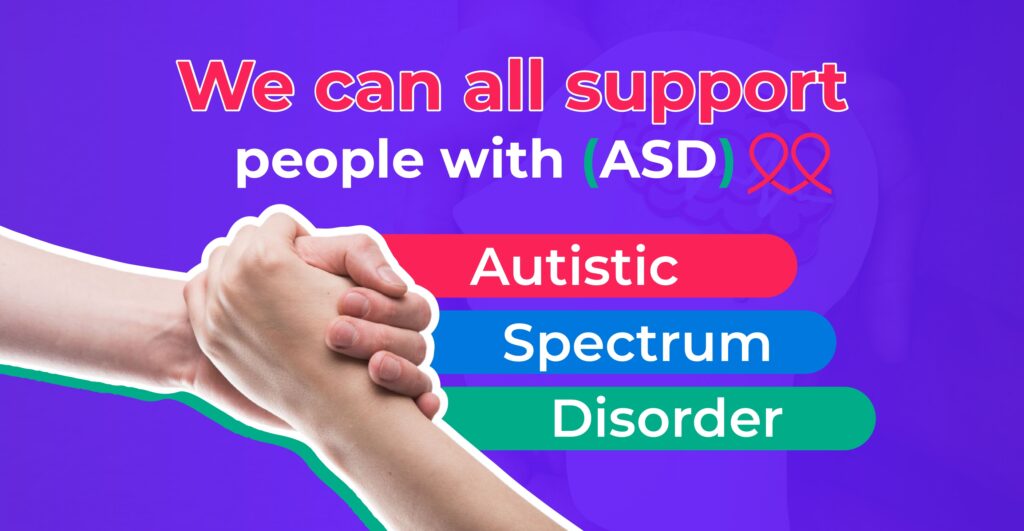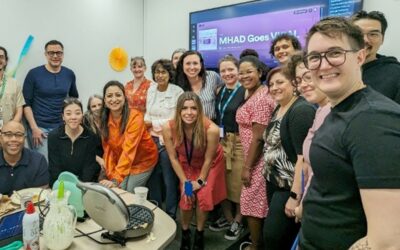Federated Health Charities’ mission is to improve the health and quality of life of all Ontarians by supporting 21 different health charities providing critical services to those experiencing, or affected by, illness. We believe education and prevention are key parts of supporting the health of our communities, so our weekly Health Hint series strives to provide tangible and easy to implement hints and tips on how to maintain your health, prevent disease, and enjoy increased quality of life. Check out our latest Health Hint, introducing neurodiversity. We hope you find it helpful. If you would like to join our efforts to support the health of Ontario, please consider a donation to Federated Health Charities.
What does neurodiversity mean?
Neurodiversity is the concept that humans engage with the environment around them in various ways; there is no one “correct” way of thinking, learning, or behaving, and variations are not seen as flaws.
What is neurodiversity?
The term neurodiversity refers to diversity amongst individuals’ brains and cognitions, although it is most associated with autism spectrum disorder (ASD) and other neurological or developmental disorders like ADHD or learning difficulties. During the 1990s, the neurodiversity movement arose, intending to increase the acceptance and inclusion of all individuals while appreciating their neurological uniqueness. Judy Singer, an Australian sociologist, invented the word “neurodiversity” to advocate equality and inclusion of “neurological minorities” at the same time. Despite its origins as a social justice movement, neurodiversity research and education are becoming increasingly significant in how physicians’ approach and treat specific impairments and neurological diseases.

The importance of language with neurodiversity
In the world of neurodiversity, words are essential. Neurodiversity advocates struggle for terminology that is both inclusive and nonjudgmental. While many disability advocacy organizations advocate for person-first language (“a person with autism”, “a person with Down syndrome”, etc.), research has shown that many autistic persons prefer identity-first language. As a result, rather than making assumptions, it’s best to ask about a person’s preferred language and speech directly. When speaking to patients with neurodevelopmental variants about their mental and physical health, clinicians should be aware of neurodiversity and use courteous language.
Neurodiversity and Autism Spectrum Disorder
Communication, learning, and behaviour impairments characterize autism spectrum disorder (ASD), and the severity varies from person to person. People with ASD may have various strengths, needs, and challenges. Some autistic persons, for example, have strong verbal skills, have an average or above-average IQ, and live independently. Others, on the other hand, may be unable to articulate their needs or feelings, battle with challenging habits that jeopardize their safety and well-being, and maybe be reliant on others for assistance in all aspects of their lives. Furthermore, some persons with autism may not experience any negative impacts at all from their disorder itself, instead, the pain may be caused by cultural constraints that lead to social exclusion and unfairness. It is important to see those who are neurodiverse as unique individual and not make assumptions about their strengths, challenges or needs.
Support for those with ASD
Individuals with ASD require medical care and therapy. Establishing a documented diagnosis, for example, may facilitate access to social and medical resources if necessary. A diagnostic explanation may assist the individual or their family in better understanding their differences and connect with others in the community. Neurodevelopmental disorders may also be linked to other health problems that need additional monitoring or treatment. To optimize quality of life and developmental potential, persons who require and prefer behavioural supports or interventions to boost communicative, social, intellectual, and daily living skills should have access to such services. Individuals will have varied objectives, interests, and requirements. Therefore, intervention techniques cannot be one-size-fits-all. It is important to connect with the appropriate medical or service provider for your unique needs.

Neurodiversity and exclusion
Our society has come to a place of increased understanding of neurodiversity, but there is still a great deal of exclusion of those that are neurodiverse and this needs to change. The exclusion of persons with neurodevelopmental disabilities can be due stigma, a lack of understanding, and a lack of adequate infrastructure. Inclusion for all individuals may be improved through education, understanding and acceptance of neurodiversity in communities, schools, healthcare settings, and workplaces. We all must work together to create a safe and supportive atmosphere for neurodiversity, recognizing and emphasizing each person’s unique skills and abilities while also providing support for their barriers and needs.
This article is just a small glimpse into neurodiversity and will set the stage for more articles to come that will look at the topic in greater detail.
We hope you enjoyed our latest Health Hint!
Written by An Lin Chen
Donation Prompt:
If you would like to support the health of Ontarians, you can donate to Federated Health Charities https://federatedhealth.ca/donating/
Join us in this year’s campaign. ⬇️
Related Articles:
The McCreary’s Story – Autism Ontario
Health Hint! – How to Support an Ill Loved One
Reference:
Understood. (n.d.) What is neurodiversity? . Retrieved April 11, 2022, from
https://www.understood.org/en/articles/neurodiversity-what-you-need-to-know
Exceptional Individuals. (2022, March 28). Neurodivergent: Types, meanings & examples of neurodiversity. Retrieved April 11, 2022, from
https://exceptionalindividuals.com/neurodiversity/
Bailin, A. (2019, June 6). Clearing up some misconceptions about neurodiversity. Scientific American Blog Network. Retrieved April 11, 2022, from










